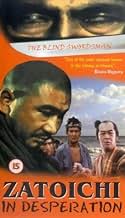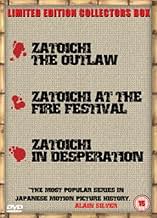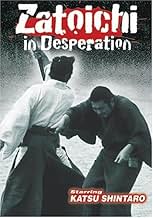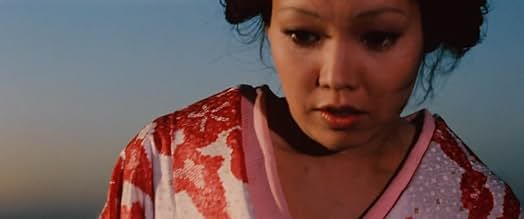VALUTAZIONE IMDb
6,8/10
1240
LA TUA VALUTAZIONE
Aggiungi una trama nella tua linguaAfter accidentally causing an old lady's death, Zatoichi seeks out her daughter to atone for the tragedy, consequently getting into all sorts of trouble.After accidentally causing an old lady's death, Zatoichi seeks out her daughter to atone for the tragedy, consequently getting into all sorts of trouble.After accidentally causing an old lady's death, Zatoichi seeks out her daughter to atone for the tragedy, consequently getting into all sorts of trouble.
- Regia
- Sceneggiatura
- Star
Recensioni in evidenza
Zatoichi in Desperation is the twenty-fourth entry in the Japanese franchise about the blind masseur, skilled swordsman and lowly yakuza with the strong moral compass. The film is the first to be directed by leading actor Shintaro Katsu. This movie starts in an unusual way as Zatoichi comes across an old woman who plays the shamisen. They cross a dilapidated bridge and have a short conversation. Zatoichi wants to give the old woman some money but she slips and falls to her death. Zatoichi feels responsible for the terrible accident and decides to visit the old woman's daughter who turns out to be a manipulative prostitute. The blind yakuza still wants to help and buy her freedom. In order to get the fifty ryo to buy her freedom, he goes to a gambling house where he gets in conflict with the local boss and his mob. The criminals are aware of Zatoichi's identity which is also the case for a wandering swordsman and a group of thugs who all want to earn the bounty on his head. In his search for forgiveness, the blind masseur soon has to fight off yakuza, swordsmen and criminals and has to deal with a prostitute whom he cannot trust.
There are a few interesting elements about this movie. First of all, the movie features some psychedelic flashbacks, supported with funky music that make the influence of the seventies' cultural trends quite obvious. Secondly, the locations are quite intriguing as the story takes place in a small town by the sea and shows the rough everyday life of exploited fishermen. Thirdly, Zatoichi gets severely injured in this movie and has to use a new technique to fight off his numerous enemies in a stunning fight sequence in the sandy town.
Despite these fresh elements, the film also has considerable downsides. The characters are neither fleshed out nor sympathetic which leads to the problem that one only cares about Zatoichi's fate. The plot starts interestingly but slows down and wastes a lot of time through a tedious middle section. The final duel between Zatoichi and a swordsman lasts for about ten seconds and looks ridiculous. Several parts of the movie feel rushed and the unusual shaky camera work makes it look like a low quality entry in the franchise.
Overall, Zatoichi in Desperation is among the weaker entries in the franchise. It has a few fresh ideas concerning camera work, score and special effects but the story and characters are too uninteresting to be memorable. I would only recommend this film to fans of old date. Those who aren't familiar with the blind swordsman yet should either start discovering the movies in chronological order or give Takeshi Kitano's version a chance.
There are a few interesting elements about this movie. First of all, the movie features some psychedelic flashbacks, supported with funky music that make the influence of the seventies' cultural trends quite obvious. Secondly, the locations are quite intriguing as the story takes place in a small town by the sea and shows the rough everyday life of exploited fishermen. Thirdly, Zatoichi gets severely injured in this movie and has to use a new technique to fight off his numerous enemies in a stunning fight sequence in the sandy town.
Despite these fresh elements, the film also has considerable downsides. The characters are neither fleshed out nor sympathetic which leads to the problem that one only cares about Zatoichi's fate. The plot starts interestingly but slows down and wastes a lot of time through a tedious middle section. The final duel between Zatoichi and a swordsman lasts for about ten seconds and looks ridiculous. Several parts of the movie feel rushed and the unusual shaky camera work makes it look like a low quality entry in the franchise.
Overall, Zatoichi in Desperation is among the weaker entries in the franchise. It has a few fresh ideas concerning camera work, score and special effects but the story and characters are too uninteresting to be memorable. I would only recommend this film to fans of old date. Those who aren't familiar with the blind swordsman yet should either start discovering the movies in chronological order or give Takeshi Kitano's version a chance.
I've seen 23 of the 26 films in the series (not including the Kitano) and this is by far the hardest to watch. It is less about Zatoichi and more about the cruelty and hardship of living in poverty in a fishing village in Edo era Japan. The film dwells very much upon the secondary characters as ends unto themselves and not just as elements in a story setting up a problem which Zatoichi will eventually resolve. Zatoichi acts as you would expect him to but he is overwhelmed by the misery and circumstances in a way that is unique in the series. Watch it by all means, but not with a light heart. I found myself also overwhelmed by the misery depicted in the film. It is unsettling.
This is the best one, number 24. Ichi realizes that he is not a hero, is making everyone's lives ultimately more violent and difficult than it would have without his existence. He is physically punished for this and still dispatches 20 dudes without using his hands.
If you don't like mean people, you know, actually effective villains, this one might make your little sensitivities buzz. The moral philosophy Katsu evaluates is artful and considerate. This is a brutal, dark, and ballsy entry.
If you don't like mean people, you know, actually effective villains, this one might make your little sensitivities buzz. The moral philosophy Katsu evaluates is artful and considerate. This is a brutal, dark, and ballsy entry.
I have not seen more than five of the classic (and undeniably classy) Zatoichi samurai films, but this is surely the best, cinematographically, so far. It;s hard to believe this was shot in Eastman Color, a kind of poor second to Technicolor (and with far less durability; either the negative was especially preserved, or digital restoration was performed by a true expert; but in any event, this film is absolutely gorgeous to look at.
The story is dark, as others have noted; but the Zatoichi series, like most of the sword-fight genre series films to come out of Japan, is pretty heavy-handed stuff; the Japanese seem to take this sort of thing very seriously. Yet there is no doubt Zatoichi "24" stands out as exceptional, from both the series and its genre. The reason, I think, is its almost total sense of social dislocation; Zatoichi is treated by the other characters as somehow less than human, and his determination to fight at the end somewhat more than human, and so he comes across as something other than human; but the other humans of the film come across as rather poor representatives of the species. I should note that there is very little dialog in this film, particularly at the most dramatic moments, which heightens our sense that we are watching some tragedy from another reality.
The question here is, has director/star Katsu pushed his character to such an extreme that he is no longer representative of his genre, but somehow an independent dramatic entity, a "grade-A film", as might be enjoyed by those who disdain genre-films? well, I suggest this film to such viewers, as the "one chambara (Japanese sword-fight)film to see". But in any event, it is an exceptional, and troubling, cinema experience for anyone.
The story is dark, as others have noted; but the Zatoichi series, like most of the sword-fight genre series films to come out of Japan, is pretty heavy-handed stuff; the Japanese seem to take this sort of thing very seriously. Yet there is no doubt Zatoichi "24" stands out as exceptional, from both the series and its genre. The reason, I think, is its almost total sense of social dislocation; Zatoichi is treated by the other characters as somehow less than human, and his determination to fight at the end somewhat more than human, and so he comes across as something other than human; but the other humans of the film come across as rather poor representatives of the species. I should note that there is very little dialog in this film, particularly at the most dramatic moments, which heightens our sense that we are watching some tragedy from another reality.
The question here is, has director/star Katsu pushed his character to such an extreme that he is no longer representative of his genre, but somehow an independent dramatic entity, a "grade-A film", as might be enjoyed by those who disdain genre-films? well, I suggest this film to such viewers, as the "one chambara (Japanese sword-fight)film to see". But in any event, it is an exceptional, and troubling, cinema experience for anyone.
It started up well, yet, at a certain point the script turned to a level of imbecility comparable with a big studio US creation. Well, compared with the level of the US Academy this can easily can take an Oscar for best script.
On the other hand this movie achieves something almost unique. The visual style is so unusual (especially for somebody used with the standard blockbuster) that both makes the film unforgettable and hard to watch. In my opinion this is what Mean Streets and The Killing of a Chinese Bookie should have looked like if the tech team involved would have been skilled enough. The gambling scene alone makes Rounders look like a half baked high-school project (which is not far from the truth anyway).
A 6 for cramming so much into this movie. You have a social message, the indolence of the rich (the young watching the fishermen's boats burn), the unromaticised noblemen, etc.
Contact me with Questions, Comments or Suggestions ryitfork @ bitmail.ch
On the other hand this movie achieves something almost unique. The visual style is so unusual (especially for somebody used with the standard blockbuster) that both makes the film unforgettable and hard to watch. In my opinion this is what Mean Streets and The Killing of a Chinese Bookie should have looked like if the tech team involved would have been skilled enough. The gambling scene alone makes Rounders look like a half baked high-school project (which is not far from the truth anyway).
A 6 for cramming so much into this movie. You have a social message, the indolence of the rich (the young watching the fishermen's boats burn), the unromaticised noblemen, etc.
Contact me with Questions, Comments or Suggestions ryitfork @ bitmail.ch
Lo sapevi?
- QuizOnly film in the original series directed by Zatoichi himself, Shintarô Katsu. He would go on to direct one more, Zatôichi (1989).
- Citazioni
Boss Mangoro Kagiya: Please enjoy watching as Zatoichi meets his end.
- ConnessioniFollowed by Mang jian xue di zi (1973)
I più visti
Accedi per valutare e creare un elenco di titoli salvati per ottenere consigli personalizzati
- How long is Zatoichi in Desperation?Powered by Alexa
Dettagli
- Data di uscita
- Paese di origine
- Lingua
- Celebre anche come
- Zatoichi in Desperation
- Aziende produttrici
- Vedi altri crediti dell’azienda su IMDbPro
- Tempo di esecuzione1 ora 35 minuti
- Mix di suoni
- Proporzioni
- 2.35 : 1
Contribuisci a questa pagina
Suggerisci una modifica o aggiungi i contenuti mancanti

Divario superiore
By what name was Shin Zatôichi monogatari: Oreta tsue (1972) officially released in India in English?
Rispondi





























